May 8
Early 6 AM start. Great just to be out in the jeep in the fresh, cool air, riding through the veld, comfortable with our blankets and hot water bottles; a tremendous sense of freedom. It’s almost as if the animals are just a little bonus. But what a bonus.
Once again, the photos are taken with my iPad. I have much better ones that I currently cannot download from my camera. So this is just a little taste. Tried to give a bit of a feel for the vehicle, the landscape and the closeness of the animals. The clear highlights of the morning were the rhino mother and weeks old baby and a leopard mother and baby.
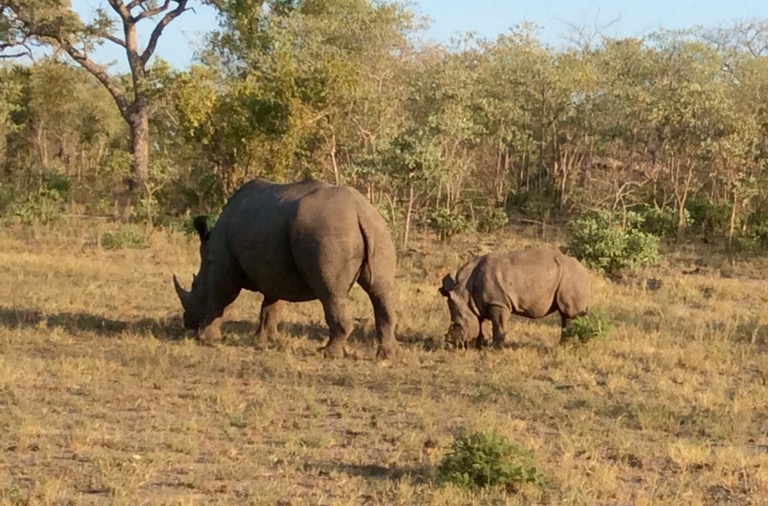 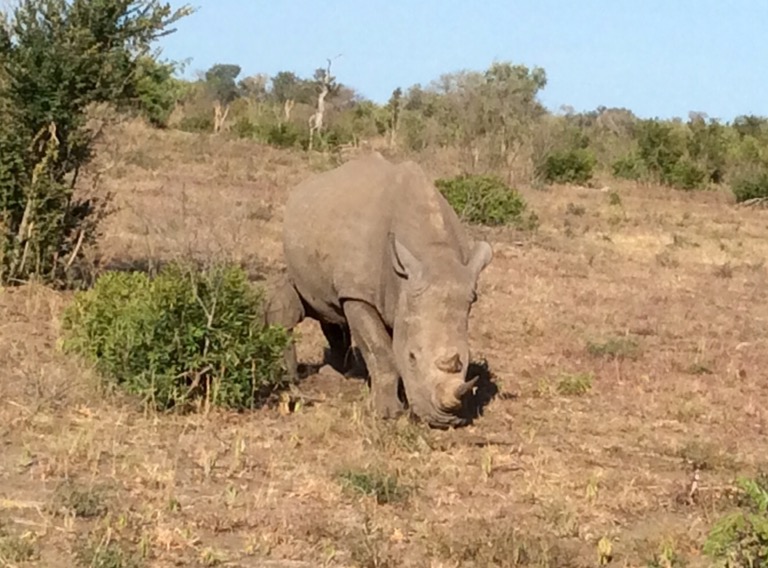 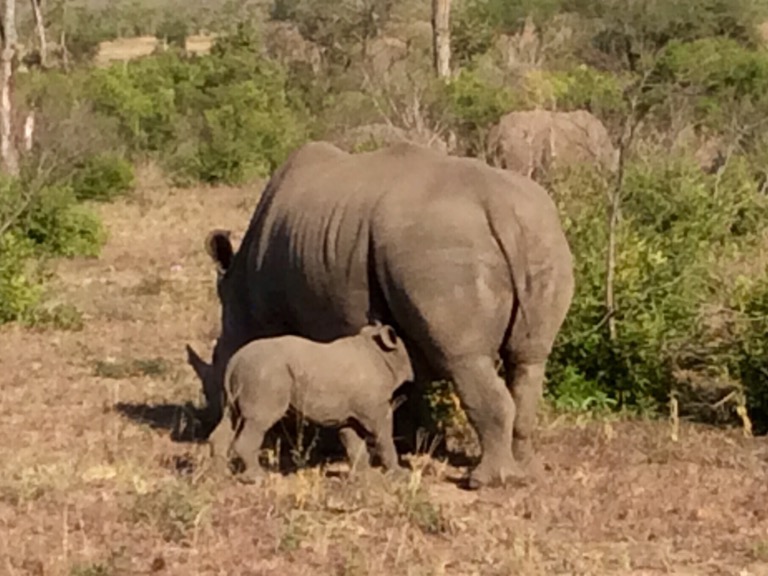 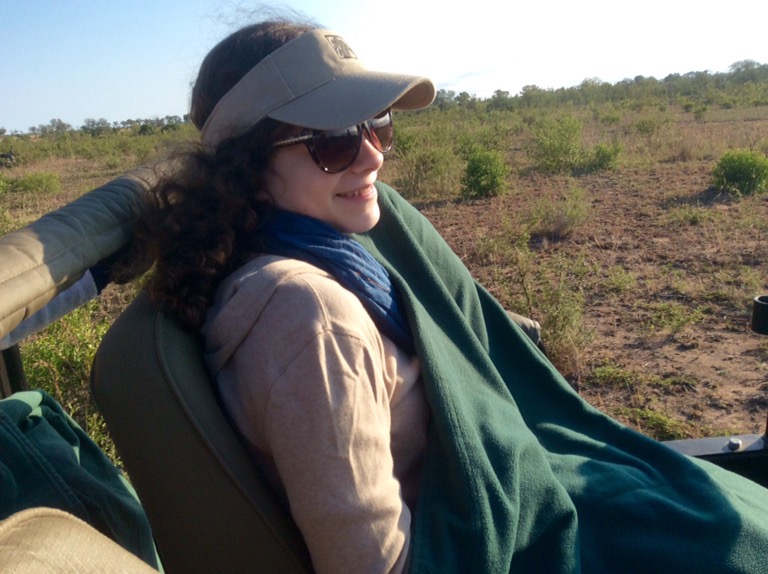 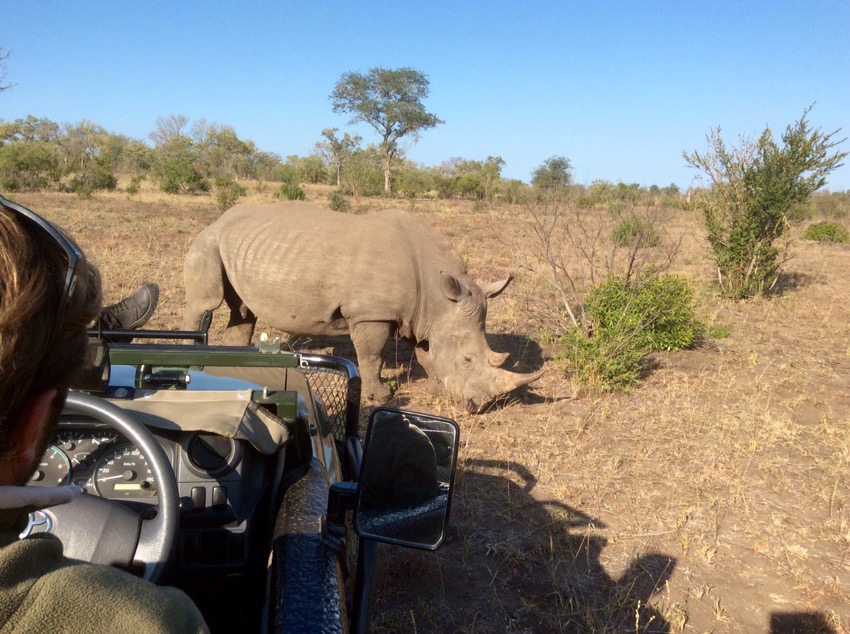  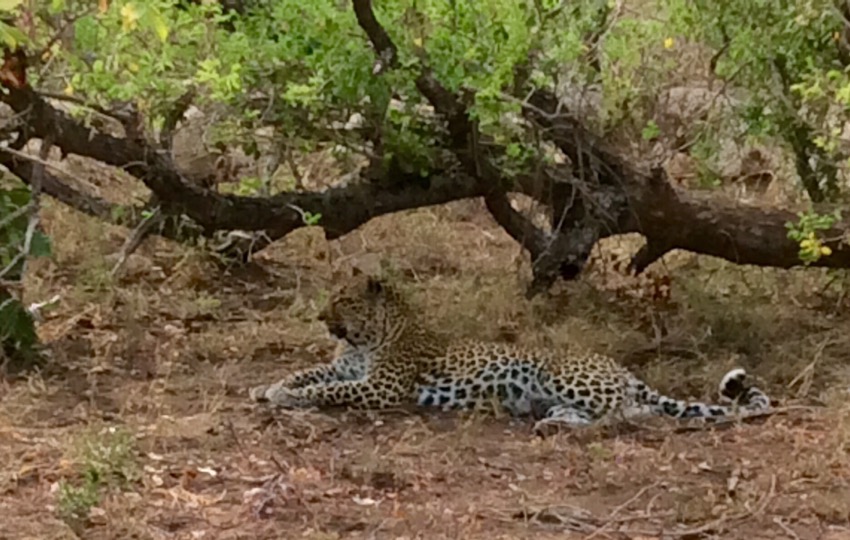  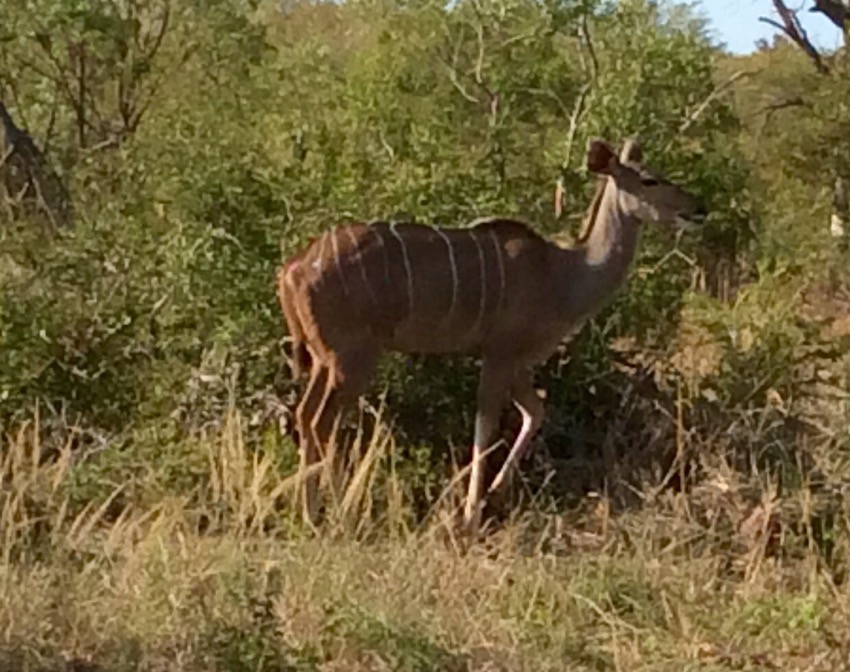 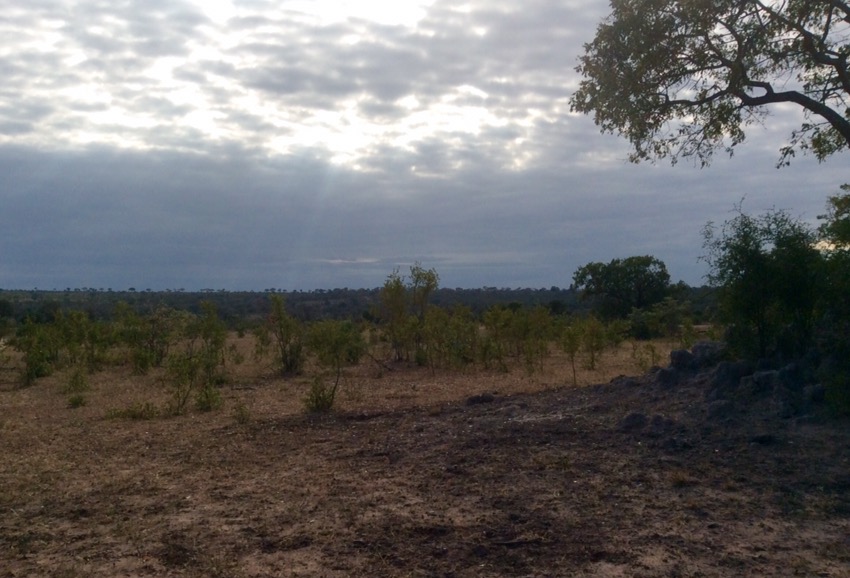
Buffet breakfast at the lodge, then immediate turn around for a visit to a local Shangaan community to gain a small insight into village life. We visited a church service, spent time watching and talking to the local sangoma (herbalist or traditional healer) and participated in some local singing and dancing. It was actually quite fun, though we certainly did not get a sense of the village the way we have in other African villages.
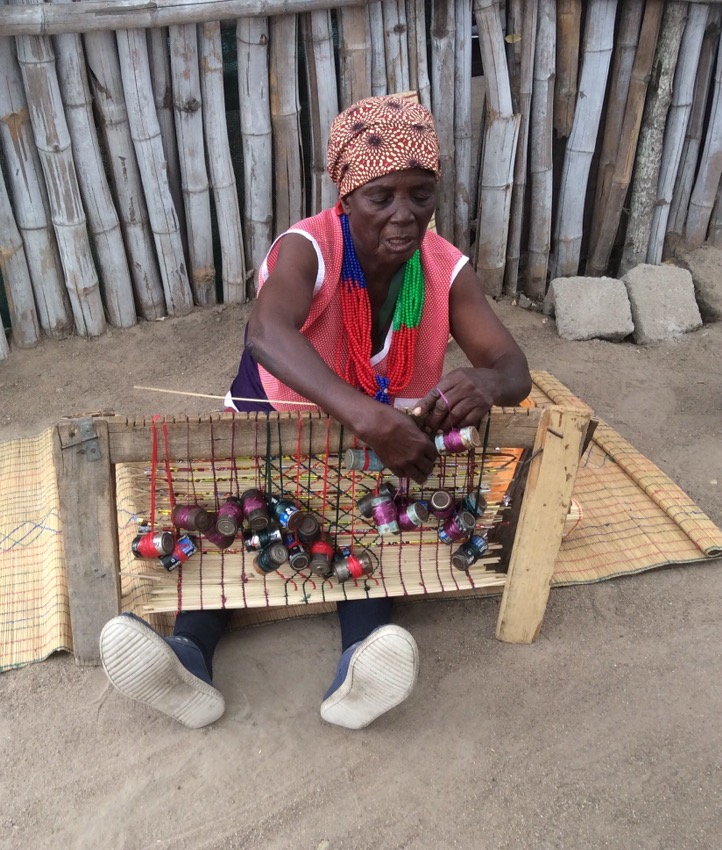  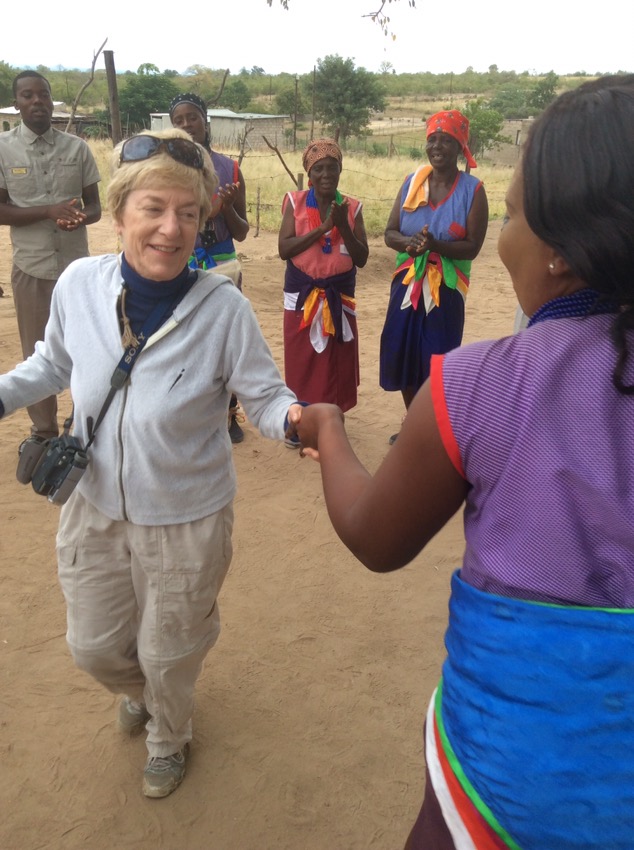 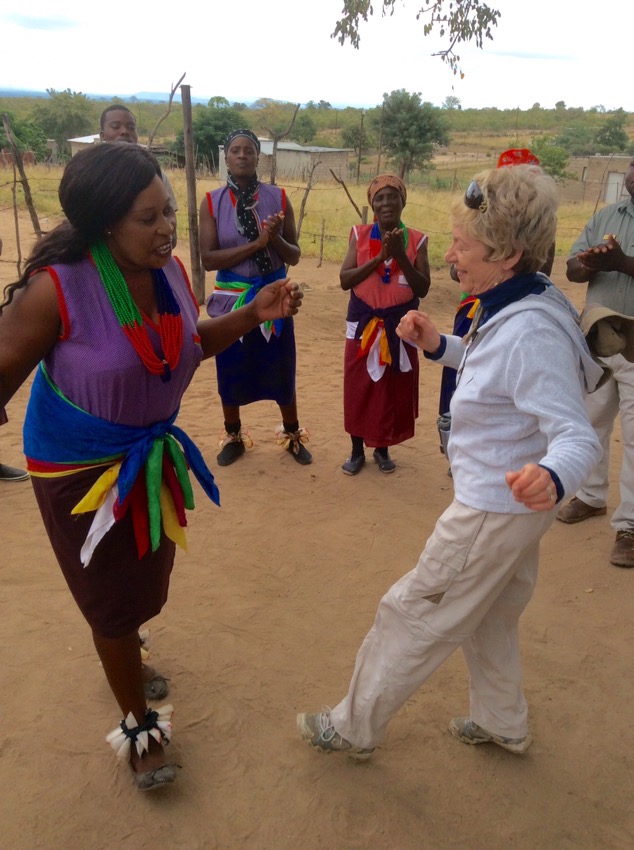 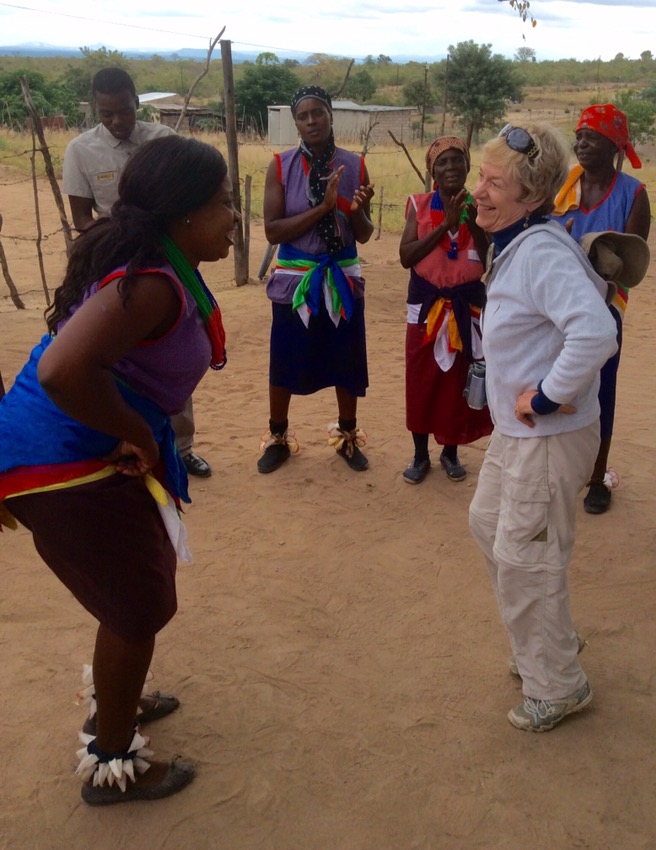 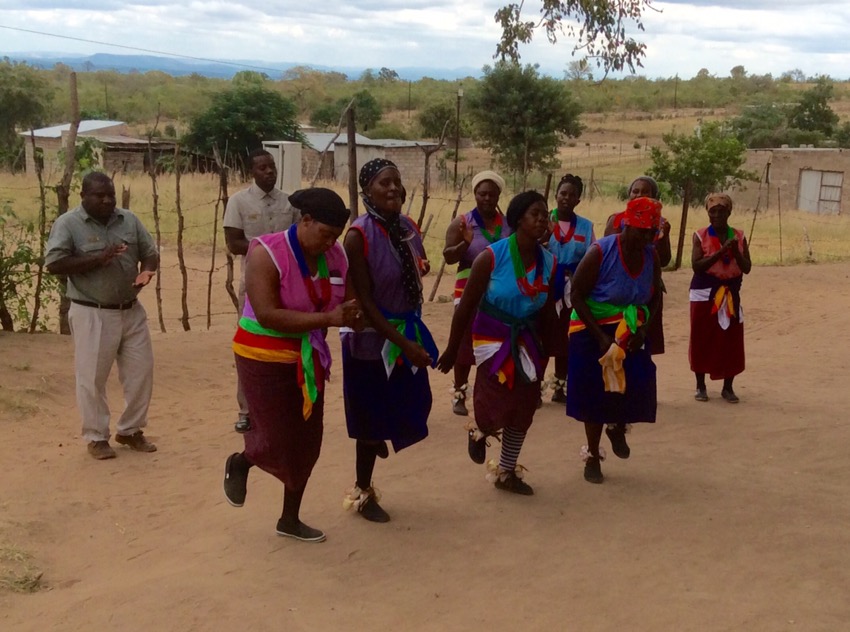 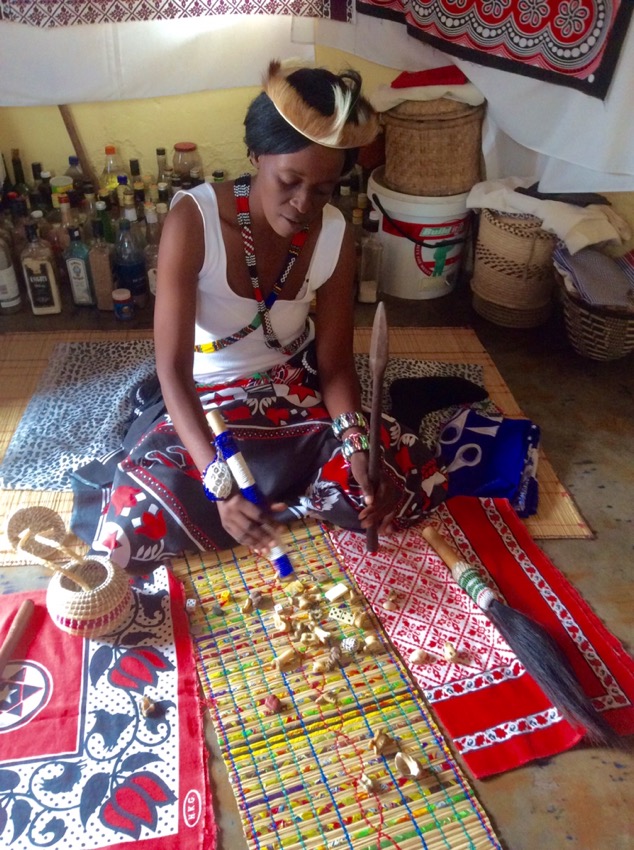 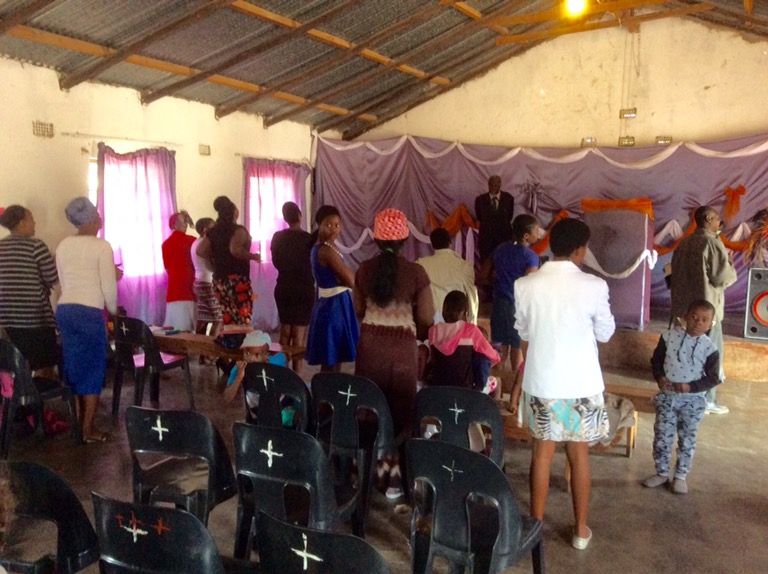 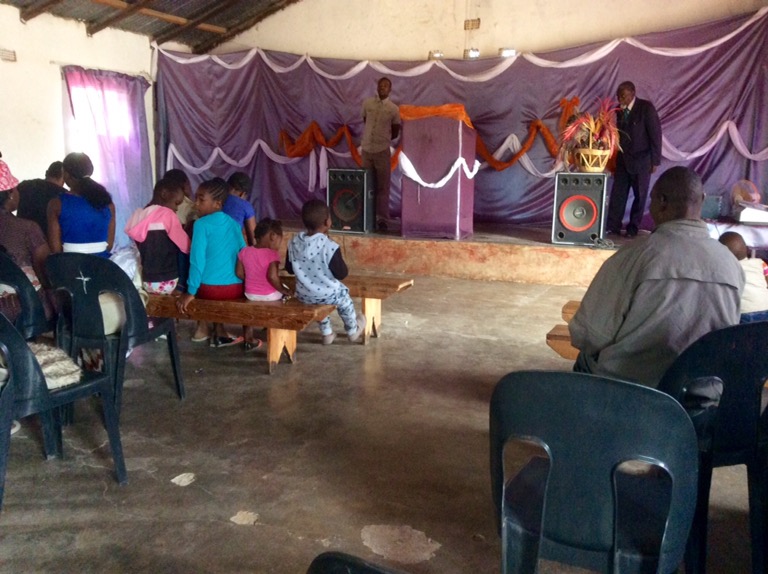
With all the talk about baby rhinos, lion cubs and leopard cubs, I don’t want anyone to think that I haven’t been keeping up with THE Cubs, checking scores every day and incredulous at just how good they are. Theo for President! And, yes, it’s good to be thousands of miles from The Donald, able to focus on a more humane wilderness.
But I digress. Light lunch (we’ve been eating non-stop), rest a bit, blog and off for our afternoon/evening game drive, after high tea on the deck at the lodge. Below is a view from the deck and some photos from the afternoon drive, which was very good, but not our best. How special the outing is depends on how lucky you are to encounter unusual sights, and we didn’t have that on this trip. Still, the freedom of driving around the veld and the contrast to our daily lives is quite staggering. And the sundowners, drinks and snacks at sundown, are a great feature of the afternoon drives.  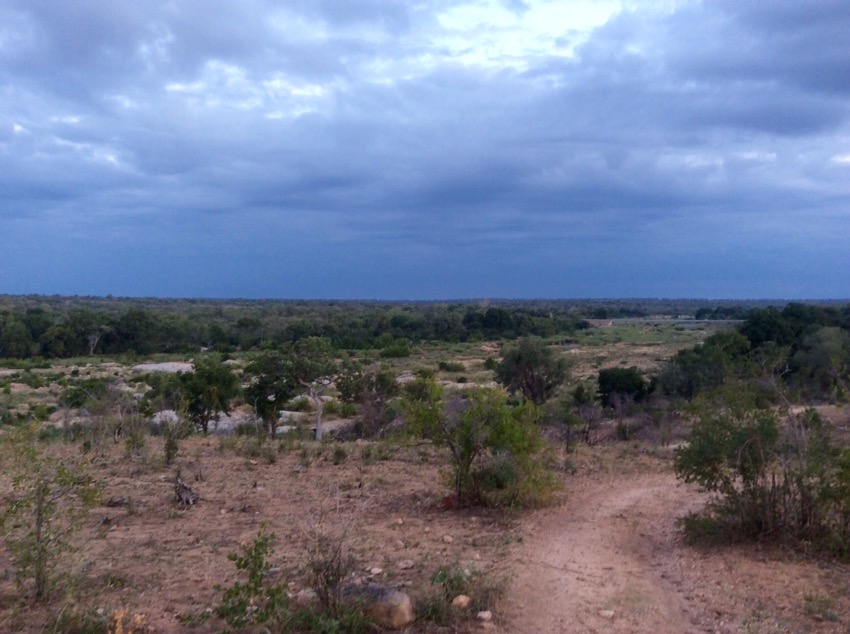   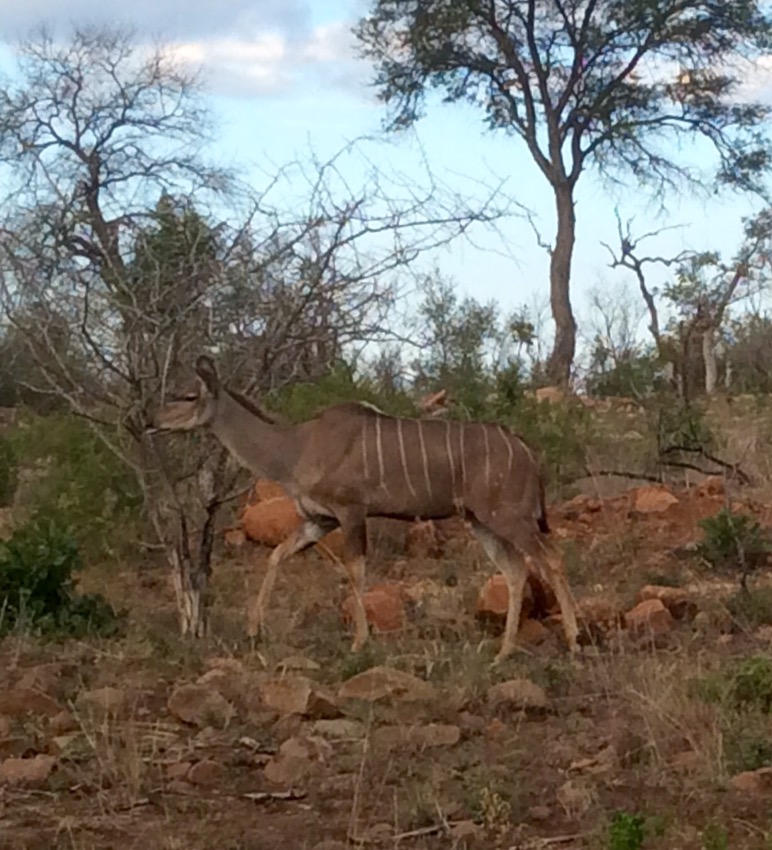 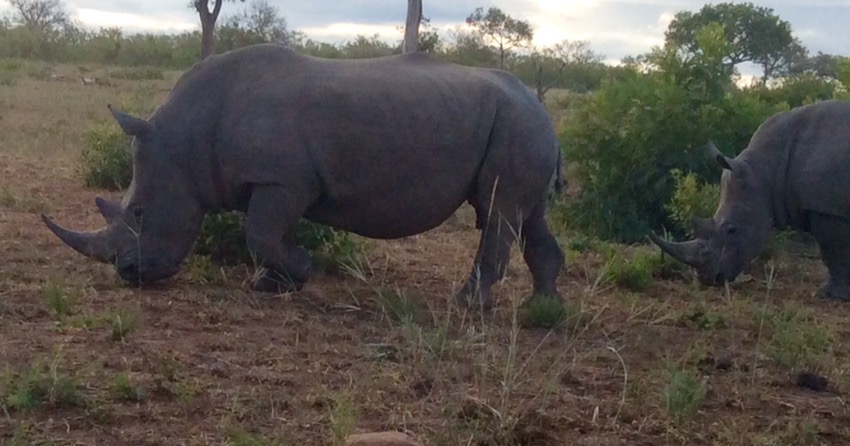

Dinner outside, lit by lanterns, with our group, which we’ve come to like a lot. Back to the room to pack, as we leave tomorrow after morning game drive and breakfast.
May 7
Up and out at 6. Lovely, clean fresh air. Coffee and muffins, then off for early morning drive. Chilly and bumpy, but gradually the sun warms us. Animals sighted include zebras, impala, rhinos, wildebeests, lions and elephants. Photos below were taken with my iPad. Frustrating not to be able to download from my camera, but I have our travel agent, Ahdina, on the case and hope to have the part when we hit Cape Town in a few days. Meanwhile, I’m dealing with it with great maturity. Aren’t you proud?
After a big buffet breakfast, we set out for a bush walk. Most interesting part of the bush walk turned out to be seeing a leopard up in a tree en route to the walk. The walk itself was about ah hour and a half, accompanied by two rifle-bearing guides. We stopped at various places where one of the guides explained things about the terrain, animal excrement and the like. Okay, but not the highlight of the trip, for sure. Zoe demurred on inhaling elephant dung smoke (Carol did) and in seeing how far she could blow Impala scat out of her mouth (I did).
Back to the lodge for yet another meal–lunch. Too full and tired to eat more than a very little. Back to the room to rest up for the afternoon safari.
Sky was very threatening as we gathered for the afternoon safari and I said to Zoe, “Looks like we may get drenched this afternoon.” She replied, “Well, at least that will be an adventure.” The perfect response to indicate that she totally gets what this is all about. When I told one of the Australian ladies in our jeep about it, she turned to Zoe and said, “Good on ya’.”
Far and away the highlight of the afternoon drive was encountering a pride of lions with two 8-month old cubs. We spent some 45 minutes photographing them, primarily the sparring between the two cubs, which, while not exactly tender, was very endearing. Unfortunately, I can’t attach any of them, but maybe I’ll figure out a way to get them to you later in the trip, if I’m able to get the part that I’m missing in Cape Town. We also saw hippos, various birds and other animals of a type we’d seen before.
Back to the lodge for a good buffet dinner (best part, I thought, was Impala). Before dinner, Phoebe calls and we do FaceTime with her and Jasper in DC. Great to see and talk with the,. We have dinner with the group we go on safari with, and we quite enjoy all of them.
Back to the room to shower, blog and get to bed early in preparation for tomorrow’s 6AM start.
I’m aware that this day may seem unexceptional, maybe even boring, if you’ve never been on safari. You’ll have to just trust me; it wasn’t. In fact it was exhilarating, especially doing it with Zoe. In photos below, note that the last one of Zoe (with the camera) has lions in the background.
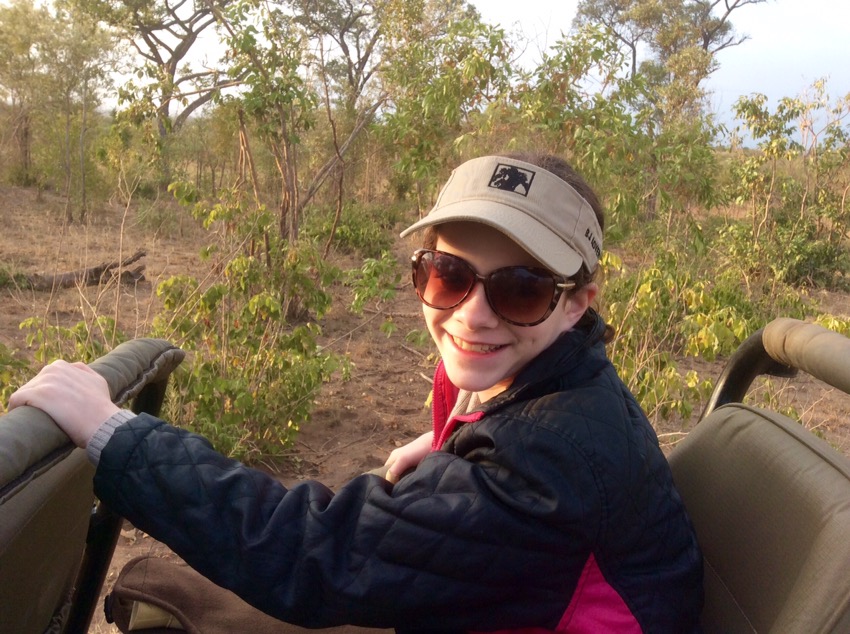
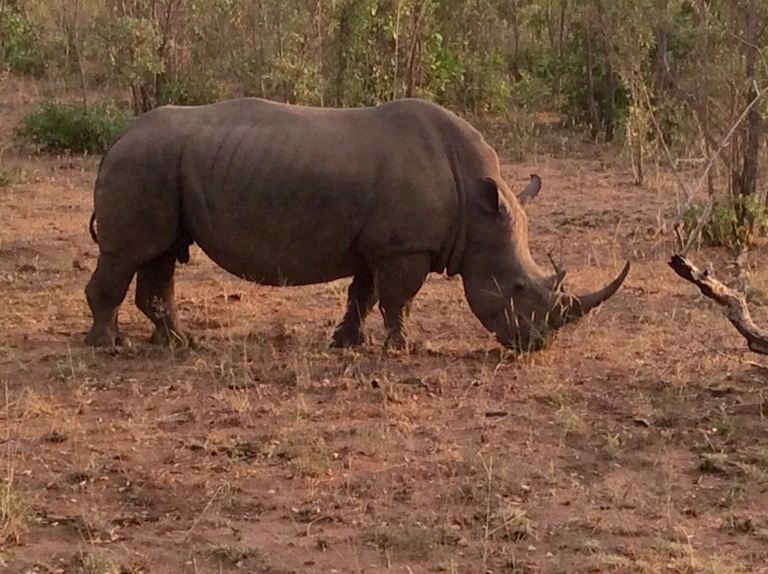 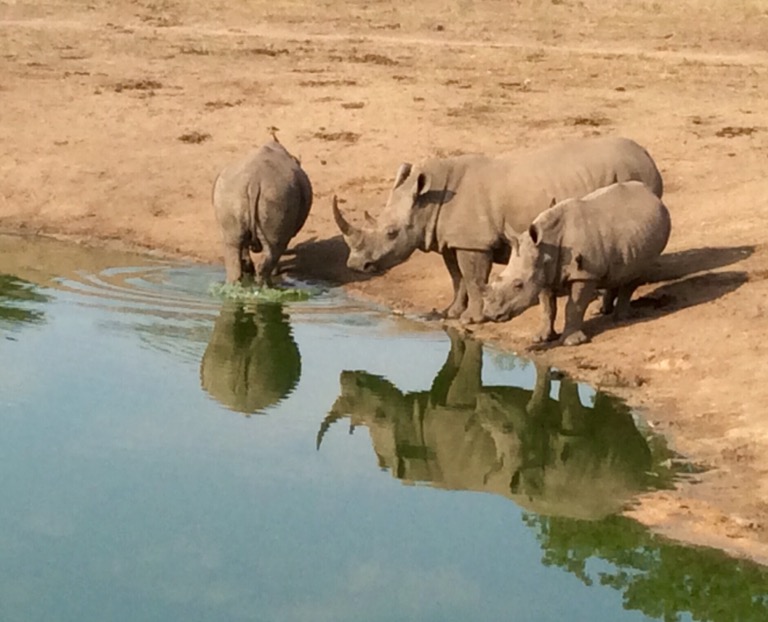 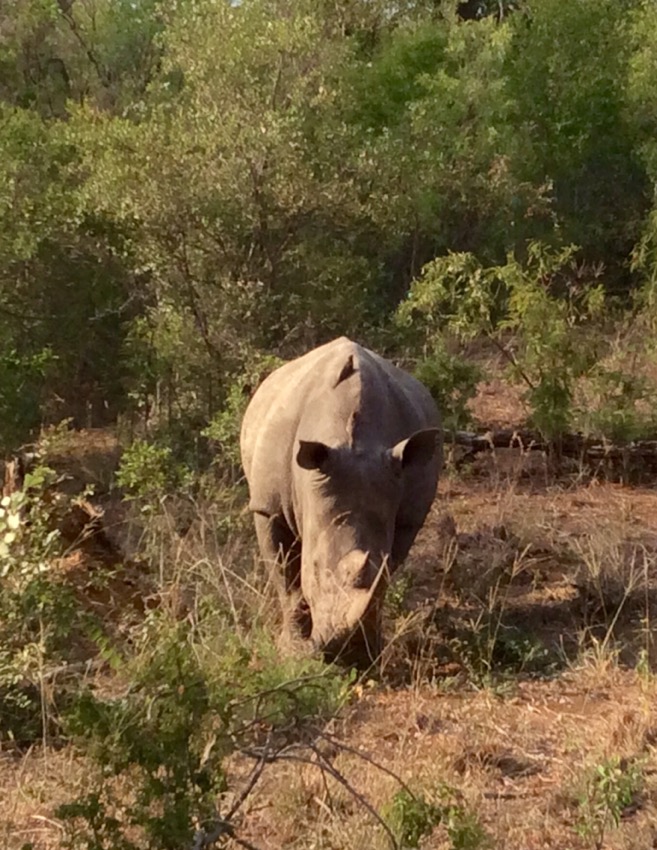 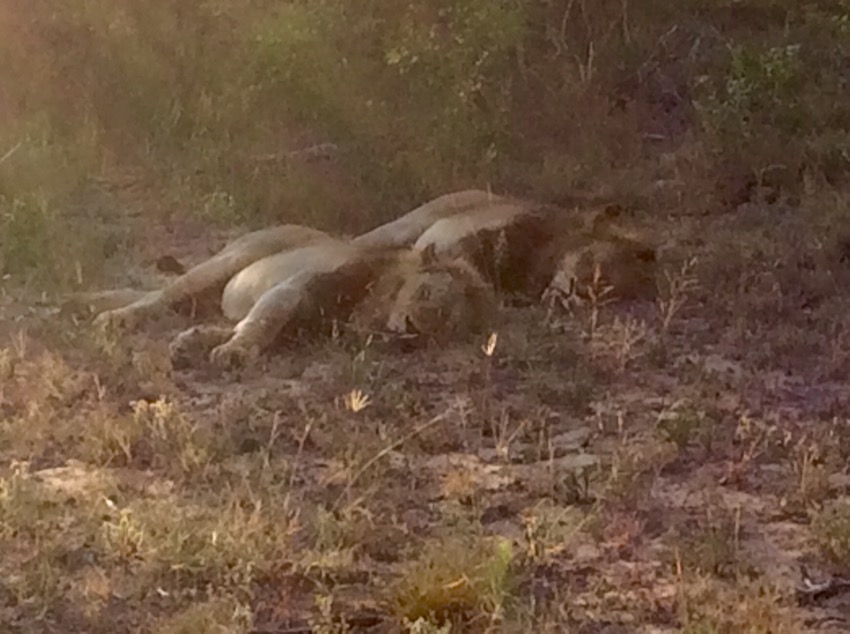 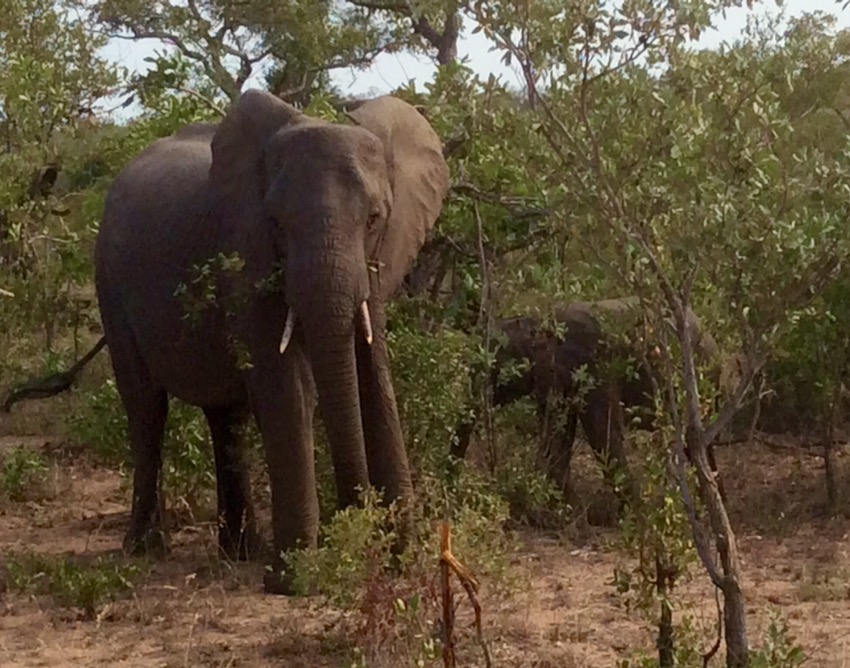  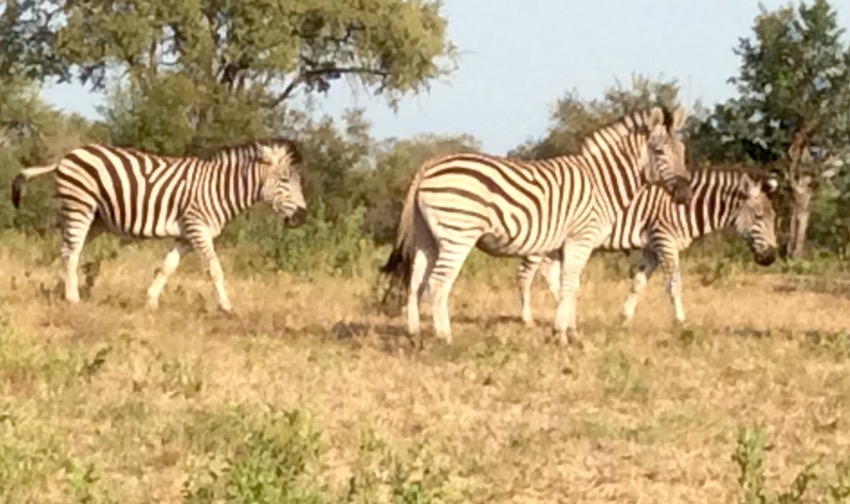
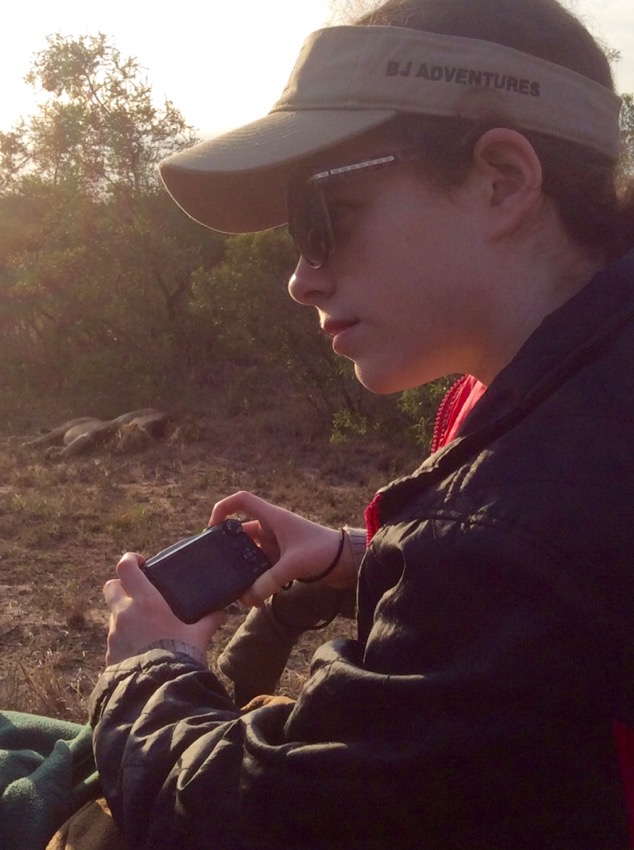
May 6
After a terrific buffet breakfast at the hotel, Freedom picked us up at 8:45 and drove us to the airport, where we waited in the comfortable and somewhat funky Federal Airlines lounge to catch our hour and a half charter flight to Sabi Sabi Bush Lodge.
Zoe has overcome a challenge this morning–swallowing a pill. Turns out that all the medication she’d taken in her almost thirteen years had been chewable, or liquid. Yesterday she’d been unable to swallow the malaria pill and wound up dissolving it in water. This morning, she tried again and, after many false starts and extensive coaching from Carol and me, she succeeded. I think the key to her success was my leaving to go down to the lobby. I’m not what one would call a patient or calm pill swallowing coach. But I do have other redeeming (to my mind) characteristics.
I think Zoe would have a more limited view of my redeeming characteristics. For example, when I told her that the excellent buffet breakfast this morning was, “God’s buffet,” she just rolled her eyes. I get a rather similar reaction to my frequent questions about whether she’s enjoying the trip (on which nothing really has happened). Still, Zoe’s reaction all comes with a hidden smirk and is done in a playful manner.
There are about 20 people on our small plane. The passengers include a group of thirteen from near Mumbai, India, three men, who are close friends, their wives and children, who travel together every year. Reminds me of our close Brandeis friends. I enjoy flying this way, as, unlike on large aircraft, you have a real sense of flight.
 We were taken from the airport to the lodge, about a half an hour drive, arriving at 1PM. We got our first taste of animals en route. Here’s a hippo. We were taken from the airport to the lodge, about a half an hour drive, arriving at 1PM. We got our first taste of animals en route. Here’s a hippo.
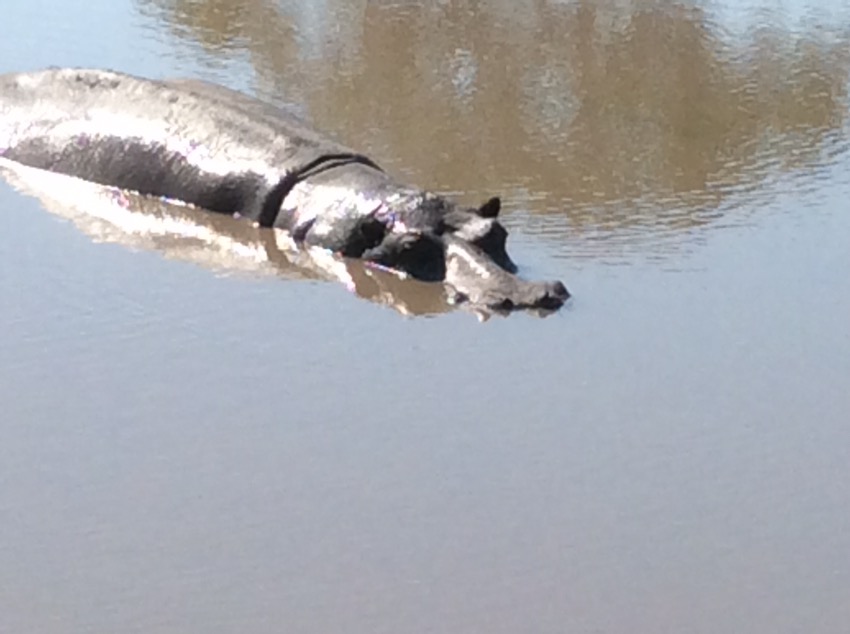
Sabi Sabi is dedicated to the need to conserve rapidly dwindling wilderness areas and to provide a sanctuary for fauna and flora as part of South Africa’s heritage. They believe that their business must be a true example of eco-tourism effectively linking tourism with conservation and the community. Sabi Sabi’s environmental management system is a holistic one, balancing the ecological needs with the needs of people and their communities, i.e. focusing on the interdependence of tourism, conservation and local communities.
Each of the 25 spacious, air-conditioned thatched suites is beautifully appointed, featuring exquisite ethnic décor in keeping with the bushveld environment. The en-suite bathrooms feature al-fresco as well as glass-fronted indoor showers, affording wonderful views. Huge viewing decks are a great setting to relax while spotting game, birdwatching, or cooling off in the pools. Meals, including the wonderful dinners in the open air boma, are heralded by blasts on a kudu horn, a summoning to delicious food. This lodge also features artistically designed open courtyards with spectacular wooden carvings by renowned South African sculptors, created from uprooted trees and wood salvaged from the surrounding bush. In short, not too shabby.
After lunch outside at the lodge, we returned to our great suite to rest and prepare for the afternoon game drive with our guide, Gus, and spotter, Jack. We have four others in our large jeep (which was a bit disappointing), two women from Australia, Sue and Heather, and a couple from St Augustine, FL, Jill and Bob. All of them seem amiable, so the group will work out fine.
We had several outstanding sightings on the drive: a pack of wild dogs (rarely seen, and Carol and I have never seen them on any of our trips), a large group of water buffalo that we got very close to and a leopard that had killed an impala, put it up in the tree so that other animals would not get it and climbed the tree to eat it’s kill. We also spotted a number of beautiful and interesting birds. Our drive was interrupted for half an hour for sundown drinks at sunset.
On returning to the lodge, we went to the extensive outdoor buffet, eating with Gus and the others from our group. Food was quite fine, not great.
On returning to the room and trying to download my photos from my camera, I discovered that I’d failed to take a wire and plug that I need to do that. Needless to say, that was VERY disappointing. Unless I’m able to get that plug three days from now in Cape Town, the only photos I’ll be able to include in this blog will be photos I take on my iPad. Damn!
I’ll close this post with the advice our friend in Turkey sent this morning, “Enjoy yourselves.
Life is short, delinquent, full of surprises, naughty, nutty, breathtakingly beautiful and deserving of our full attention! Go forth and attend!” We plan to do just that.
May 4-5
Wendy and entire family drive us and Zoe to the Atlanta airport. Phoebe is flying with us to DC, because she’s been invited to DC to spend a week visiting her cousins Jasper and Riley at Aunt Jodi and Uncle Robby’s house. Not Africa, but a nice consolation prize.
Drop off and security went smoothly, except that Carol’s boarding pass got rejected, so she had to go back to the counter and we got separated and had to meet up at the gate. Zoe was missing a plug that would permit her to download photos from her camera to the iPad. Fortunately, though, there’s an Apple Store in the Atlanta airport so that we were able to buy the plug.
Flew to Dulles, where Aunt Jodi met us at the gate. We stopped for a bite at a restaurant, and Jodi left for home with Phoebe. Here are the sisters at Dulles, and a photo of Zoe, as the well-dressed traveler to Africa.
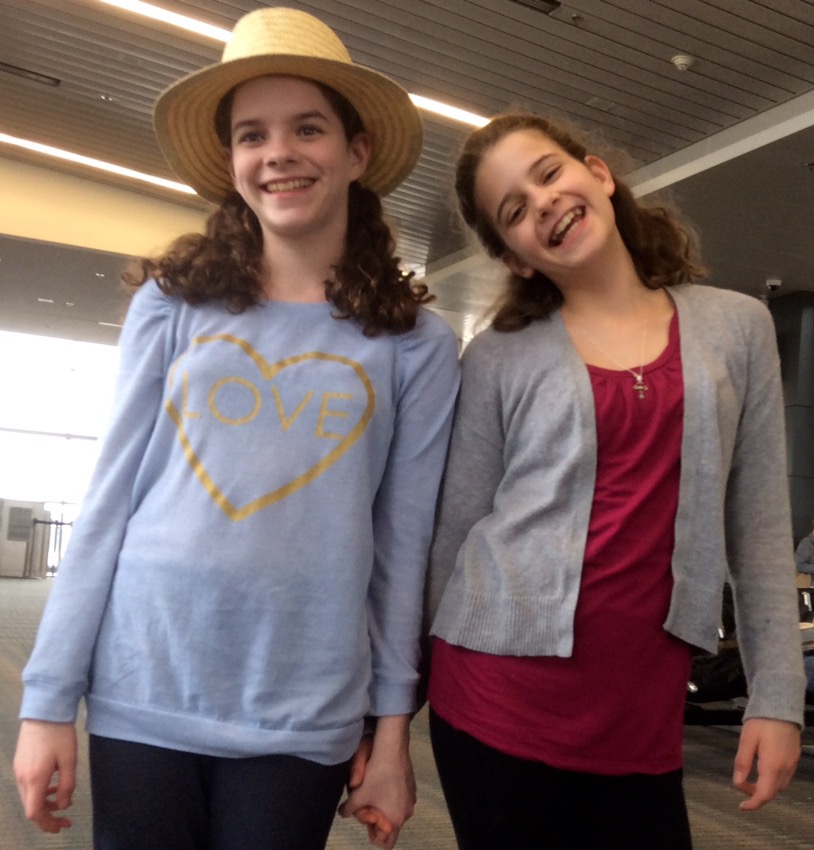
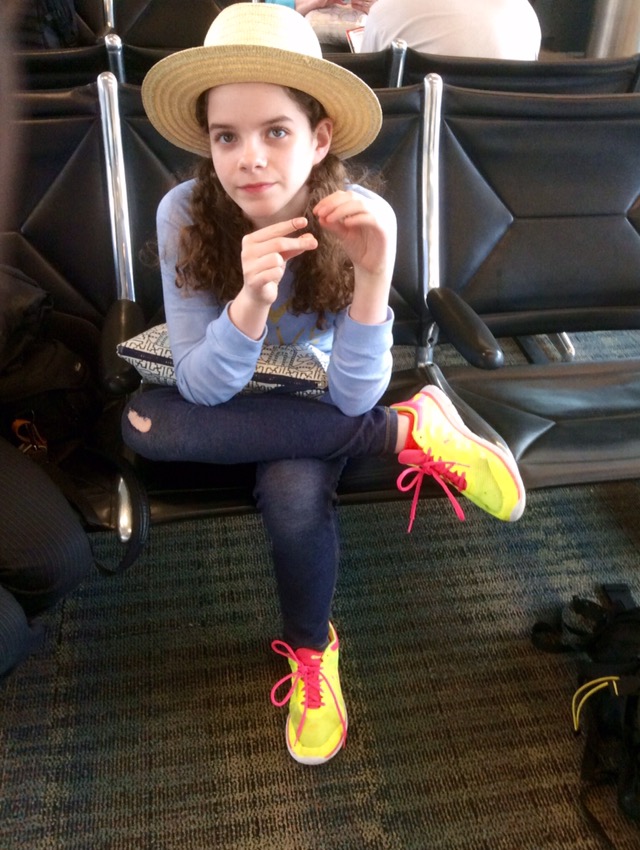
Zoe, Carol and I killed about three hours at Dulles, charging devices and the like, before we boarded our flight to Africa.
Now, in the abstract, a trip to South Africa and Malawi sounds pretty romantic, and it is. There are, however, some decidedly non-romantic elements, such as the twenty-five hours that will have elapsed from sallying forth for the Atlanta airport and landing in Johannesburg. The flight from Dulles is about 17 hours, with an hour layover in Dakar, Senegal, during which we’ll remain on the plane. Of course, I expect no sympathy, given the payoff at the other end, and the fact that I get to ride with Zoe in the seat next to me.
On the flight I have already finished reading The Rosie Effect, the very charming and funny sequel to The Rosie Project, and I’ll start The Soft Vengeance of a Freedom Fighter by Albie Sachs, a former justice of the South African Constitutional Court, about whom you’ll hear more later in the trip. And, then, there’s blogging and trying (almost certainly unsuccessfully) to sleep. May try a movie or two, as well.
Carol and I travelled to South Africa thirteen years ago, with our friends Judd and Linda Miner, Bob Bennett and Harriet Trop. On that trip, we also visited Botswana and Zambia. Africa had always seemed the dream trip to Carol and me, and it was. That trip may still be our favorite ever. We assumed, at the time, that it would be our one and only trip to Africa.
It hasn’t quite turned out that way. In fact, this trip is our eleventh and, in addition to the countries we saw on our first trip, we’ve visited Kenya (twice), Uganda, Tanzania, Egypt, Ghana (five times), Nigeria (twice) and Namibia. On this trip, we’ll add Malawi and, possibly, Mozambique. We could legitimately add Morocco (and a twelfth trip) to the list, since we went there for eight days in 1967. You could say that we’re a bit drawn to Africa.
Finished Albie Sach’s book and saw a pretty cute Will Ferrel movie. Played a bunch of video games with Zoe on her iPad and lost badly. I think she may be cheating, though I haven’t figured out how.
After clearing customs in Joburg, which was quite slow because of inadequate staff, we were met by our driver/guide, Freedom Dube, who Carol and I had met on our trip to Namibia last year. Freedom drove us to the hotel, the Southern Sun near OR Tambo International Airport, and helped us with check in. Our room is quite adequate, as was our dinner at the hotel. Back to the room to blog, email, shower and retire early, exhausted from the long trip. Tomorrow, we start in earnest.
May 3
First, I promised you a link to Zoe’s blog, so here it is http://traveltween.blogspot.com/. And, just remember, I’m gonna have to deal with this kid for 2 1/2 weeks. To make it clear, I am not going to review or edit her posts, so, if she uses obscene language or otherwise offends you, don’t blame me 😄.
Carol and I have been in Atlanta since Sunday, enjoying family and friends. Spent Sunday afternoon with Carol’s Brandeis classmate, Eve Levine, and her husband, David. As we hadn’t seen them in a couple years, it was great to have a full afternoon to catch up.
Then on Monday, we got to have brunch with our good friends from San Francisco, Steve and Karen Sugarman, with whom we’ve traveled in the past, including to the South of India. Steve teaches law at Berkeley, and has been a friend since we started law school together at Northwestern. He was in Atlanta for a conference. It’s always a treat to spend time with Steve and Karen.
The rest of our Atlanta time was spent with Zoe, Phoebe and Max (and, oh yes, Wendy and Chris). Zoe and Phoebe performed in a showcase, which was part of the reason we came in to Atlanta a few days early. Not hey we’re both terrific (naturally), but there were too many non-grandchild numbers, in my opinion. This morning I spent 1 hour 16 minutes in charge of Maxi, age 3 1/2 years. We had a great time, and I think I would have been good for at least another six minutes, if his mommy had not come back. Photo below is from Grand Cayman, June, 2015.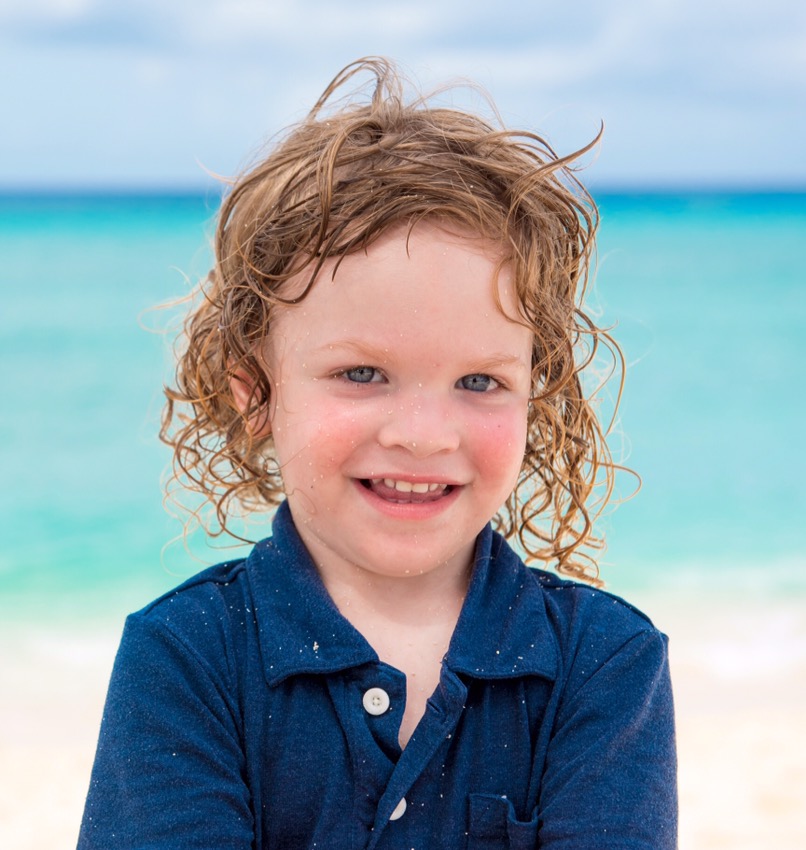
We had a family post-lunch hootenanny on Tuesday, with Phoebe and Chris on guitars, and Zoe on the ukele. They are an awesome trio, taught by Chris, playing many of the songs that were popular in our youth.
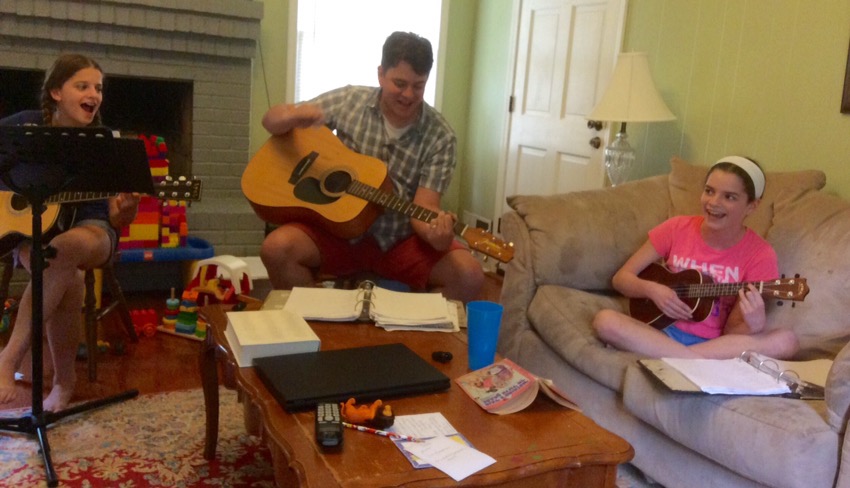
Okay, ready for a history lesson? If not, glance at the map below and rejoin us on the next post.
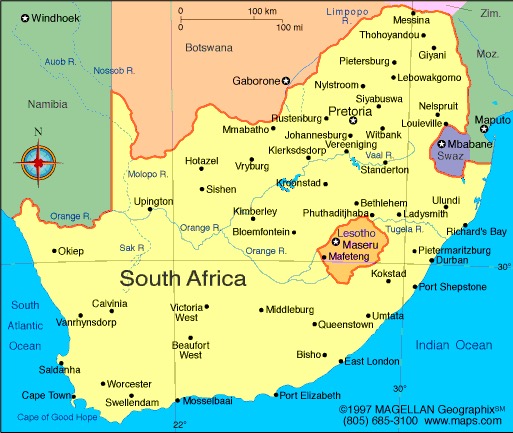 Normally, I steal and piece together information about countries to which we travel from several sources. This time, though, the historical description below is from Information Please. It certainly is not complete, but it was about as long as I thought most of you could tolerate. If I’m wrong, you can get a fuller description from the South African government website, http://www.gov.za/about-sa/history or on Wikipedia, https://en.m.wikipedia.org/wiki/South_Africa. The first five general paragraphs below are adapted from Wikipedia. Normally, I steal and piece together information about countries to which we travel from several sources. This time, though, the historical description below is from Information Please. It certainly is not complete, but it was about as long as I thought most of you could tolerate. If I’m wrong, you can get a fuller description from the South African government website, http://www.gov.za/about-sa/history or on Wikipedia, https://en.m.wikipedia.org/wiki/South_Africa. The first five general paragraphs below are adapted from Wikipedia.
South Africa, officially the Republic of South Africa, is the southernmost sovereign state in Africa. It is bounded on the south by 2,798 kilometers of coastline of Southern Africa stretching along the South Atlantic and Indian Oceans, on the north by the neighboring countries of Namibia, Botswana and Zimbabwe, and on the east by Mozambique and Swaziland, and surrounding the kingdom of Lesotho. South Africa is the 25th-largest country in the world by land area, and with close to 53 million people (note: about 55 million now), is the world’s 24th-most populous nation. It is the southernmost country on the mainland of the Old World or the Eastern Hemisphere.
South Africa is a multiethnic society encompassing a wide variety of cultures, languages, and religions. Its pluralistic makeup is reflected in the constitution’s recognition of 11 official languages, which is among the highest number of any country in the world. Two of these languages are of European origin: Afrikaans developed from Dutch and serves as the first language of most white and coloured South Africans; English reflects the legacy of British colonialism, and is commonly used in public and commercial life, though it is fourth-ranked as a spoken first language.
The country is one of the few in Africa never to have had a coup d’état, and regular elections have been held for almost a century. However, the vast majority of black South Africans were not enfranchised until 1994. During the 20th century, the black majority sought to recover its rights from the dominant white minority, with this struggle playing a large role in the country’s recent history and politics. The National Party imposed apartheid in 1948, institutionalizing previous racial segregation. After a long and sometimes violent struggle by the African National Congress and other anti-apartheid activists both inside and outside the country, discriminatory laws began to be repealed or abolished from 1990 onwards.
About 80 percent of South Africans are of Sub-Saharan African ancestry, divided among a variety of ethnic groups speaking different Bantu languages, nine of which have official status. The remaining population consists of Africa’s largest communities of European (white), Asian (Indian), and multiracial (coloured) ancestry. Since 1994, all ethnic and linguistic groups have had political representation in the country’s democracy, which comprises a parliamentary republic and nine provinces. South Africa is often referred to as the “Rainbow Nation” to describe the country’s newly developing multicultural diversity in the wake of segregationist apartheid ideology.
Until late 2015, the World Bank classified South Africa as an upper-middle-income economy. South Africa today is a developed country and a newly industrialized country. Its economy is the second-largest in Africa, and the 34th-largest in the world. In terms of purchasing power parity, South Africa has the seventh-highest per capita income in Africa. However, poverty and inequality remain widespread, with about a quarter of the population unemployed and living on less than US$1.25 a day. Nevertheless, South Africa has been identified as a middle power in international affairs, and maintains significant regional influence.
History
The San people were the first settlers; the Khoikhoi and Bantu-speaking tribes followed. The Dutch East India Company landed the first European settlers on the Cape of Good Hope in 1652, launching a colony that by the end of the 18th century numbered only about 15,000. Known as Boers or Afrikaners, and speaking a Dutch dialect known as Afrikaans, the settlers as early as 1795 tried to establish an independent republic.
After occupying the Cape Colony in that year, Britain took permanent possession in 1815 at the end of the Napoleonic Wars, bringing in 5,000 settlers. Anglicization of government and the freeing of slaves in 1833 drove about 12,000 Afrikaners to make the “great trek” north and east into African tribal territory, where they established the republics of the Transvaal and the Orange Free State.
The discovery of diamonds in 1867 and gold nine years later brought an influx of “outlanders” into the republics and spurred Cape Colony prime minister Cecil Rhodes to plot annexation. Rhodes’s scheme of sparking an “outlander” rebellion, to which an armed party under Leander Starr Jameson would ride to the rescue, misfired in 1895, forcing Rhodes to resign. What British expansionists called the “inevitable” war with the Boers broke out on Oct. 11, 1899. The defeat of the Boers in 1902 led in 1910 to the Union of South Africa, composed of four provinces, the two former republics, and the old Cape and Natal colonies. Louis Botha, a Boer, became the first prime minister. Organized political activity among Africans started with the establishment of the African National Congress in 1912.
South Africa’s Independence is Tarnished by Apartheid
Jan Christiaan Smuts brought the nation into World War II on the Allied side against Nationalist opposition, and South Africa became a charter member of the United Nations in 1945, but he refused to sign the Universal Declaration of Human Rights. Apartheid—racial separation—dominated domestic politics as the Nationalists gained power and imposed greater restrictions on Bantus (black Africans), Asians, and Coloreds (in South Africa the term meant any nonwhite person). Black voters were removed from the voter rolls in 1936. Over the next half-century, the nonwhite population of South Africa was forced out of designated white areas. The Group Areas Acts of 1950 and 1986 forced about 1.5 million Africans to move from cities to rural townships, where they lived in abject poverty under repressive laws.
South Africa declared itself a republic in 1961 and severed its ties with the Commonwealth, which strongly objected to the country’s racist policies. The white supremacist National Party, which had first come to power in 1948, would continue its rule for the next three decades.
In 1960, 70 black protesters were killed during a peaceful demonstration in Sharpesville. The African National Congress (ANC), the principal antiapartheid organization, was banned that year, and in 1964 its leader, Nelson Mandela, was sentenced to life imprisonment. Black protests against apartheid grew stronger and more violent. In 1976, an uprising in the black township of Soweto spread to other black townships and left 600 dead. Beginning in the 1960s, international opposition to apartheid intensified. The UN imposed sanctions, and many countries divested their South African holdings.
Apartheid’s grip on South Africa began to give way when F. W. de Klerk replaced P. W. Botha as president in 1989. De Klerk removed the ban on the ANC and released its leader, Nelson Mandela, after 27 years of imprisonment. The Inkatha Freedom Party, a black opposition group led by Mangosuthu Buthelezi, which was seen as collaborating with the apartheid system, frequently clashed with the ANC during this period.
Apartheid is Abolished; Mandela Becomes President
In 1991, a multiracial forum led by de Klerk and Mandela, the Convention for a Democratic South Africa (CODESA), began working on a new constitution. In 1993, an interim constitution was passed, which dismantled apartheid and provided for a multiracial democracy with majority rule. The peaceful transition of South Africa from one of the world’s most repressive societies into a democracy is one of the 20th century’s most remarkable success stories. Mandela and de Klerk were jointly awarded the Nobel Peace Prize in 1993.
The 1994 election, the country’s first multiracial one, resulted in a massive victory for Mandela and his ANC. The new government included six ministers from the National Party and three from the Inkatha Freedom Party. A new national constitution was approved and adopted in May 1996.
In 1997 the Truth and Reconciliation Commission, chaired by Desmond Tutu, began hearings regarding human rights violations between 1960 and 1993. The commission promised amnesty to those who confessed their crimes under the apartheid system. In 1998, F. W. de Klerk, P.W. Botha, and leaders of the ANC appeared before the commission, and the nation continued to grapple with its enlightened but often painful and divisive process of national recovery.
Mbeki Takes Over From Mandela
Nelson Mandela, whose term as president cemented his reputation as one of the world’s most farsighted and magnanimous statesmen, retired in 1999. On June 2, 1999, Thabo Mbeki, the pragmatic deputy president and leader of the ANC, was elected president in a landslide, having already assumed many of Mandela’s governing responsibilities.
In his first term, Mbeki wrestled with a slumping economy and a skyrocketing crime rate. South Africa, the country with the highest number of HIV-positive people in the world (6.5 million in 2005), has been hampered in fighting the epidemic by its president’s highly controversial views. Mbeki has denied the link between HIV and AIDS and claimed that the West has exaggerated the epidemic to boost drug profits. The international community as well as most South African leaders, including Nelson Mandela and Desmond Tutu, have condemned Mbeki’s stance. In 2006, 60 international scientists called the government’s policies “disastrous and pseudo-scientific.”
As expected, on April 15, 2004, the African National Congress won South Africa’s general election in a landslide, taking about 70% of the vote, and Thabo Mbeki was sworn in for a second term.
In Dec. 2007, African National Committee delegates chose Jacob Zuma as their leader, ousting Mbeki, who had been in control of the party for the last ten years. Zuma was acquitted of rape charges in 2006. In late December, prosecutors reopened corruption charges against Zuma and ordered him to face trial for “various counts of racketeering, money laundering, corruption, and fraud.” He was accused of accepting more than $440,000 in bribes in exchange for helping a friend, Schabir Shaik, secure $5 billion in an arms deal and other government contracts. Zuma’s lawyers accused Mbeki of trying to sabotage Zuma’s political career. A High Court judge dismissed the corruption charges against Zuma in September 2008, saying the government mishandled the prosecution. The judge also criticized President Mbeki for attempting to influence the prosecution of Zuma.
Motlanthe Serves as “Interim” President; Opposition to the ANC Grows
Under pressure from leaders the African National Congress (ANC), Mbeki announced he would step down just days after Zuma was cleared. While party leader’s cited Mbeki’s alleged interference in the corruption case against Zuma, Mbeki’s resignation culminated several years of bitter infighting between Zuma and Mbeki, which led to discord in the ANC. On Sep. 25, Parliament elected Kgalema Motlanthe, a labor leader who was imprisoned during apartheid, as president. Zuma must be a member of Parliament before he can be elected president. Parliamentary elections are expected in early 2009.
On his first day as president, Motlanthe acted to move beyond Mbeki’s resistance to using modern and effective methods, such as antirretroviral medicines, to tackle its AIDS crisis by replacing South Africa’s health minister, Manto Tshabalala-Msimang, who has suggested that garlic, lemon juice, and beetroot could cure AIDS, with Barbara Hogan. “The era of denialism is over,” she said. More than 5.7 million South Africans are HIV-positive, the highest number of any country in the world.
In November, about 6,400 dissident members of the ANC held a convention in Johannesburg and decided to form a new party that will challenge the leadership of the ANC. The delegates, many of whom supported former president Mbeki, expressed dissatisfaction with the leadership of the party, calling it corrupt, authoritarian, and “rotting.” In December, the new party, the Congress of the People (COPE), selected former defense minister Mosiuoa Lekota as its president.
Zuma Assumes the Presidency
South African’s Supreme Court reinstated corruption charges against Zuma in January 2009, saying that a lower court had “overstepped” its authority in dismissing the charges. However, the country’s prosecuting authority dropped all charges against Zuma in April, about two weeks before national elections, citing “intolerable abuse” by investigators who were loyal to former president Mbeki.
In April’s general election, the ruling party, the African National Congress, won overwhelming support, taking 65.9% of the vote, just shy of a two-thirds majority, which is required to change the constitution. Parliament elected Zuma president in May.
In Dec. 2012, Zuma was again elected leader of the African National Congress, which stands him in good stead for the 2014 presidential elections. Many considered this a significant victory for Jacob Zuma, achieved in spite of criticism for his goverment’s handling of the wage protests in Marikana in which 34 people were brutally killed by police.
Mandela Dies
Olympic runner and national hero Oscar Pistorius was arrested in February 2013 and charged with the shooting death of his girlfriend, Reeva Steenkamp. She was found dead in his apartment. Pistorius denied he killed her and was released on bail. His trial began in April 2014. He testified that he shot Steenkamp by mistake, believing she was an intruder in the bathroom. He was found guilty of of culpable homicide, which is similar to manslaughter, in September 2014 and sentenced to five years in jail.
On Dec. 5, 2013, Nelson Mandela died at age 95. He had been in ill health for several months after battling a lung infection. South Africans and people all over the world mourned his death but at the same time celebrated his remarkable life.
ANC Prevails in 2014 Elections; Army Called in to Quell Anti-Immigrant Violence
The ANC took 62.2% of the vote in May 2014 elections, handing Zuma a second term as president. The opposition Democratic Alliance placed second, 22.2%. Despite its landslide victory, the ANC has seen its popularity diminish in recent years due to allegations of corruption, growing income inequality, and disenchantment with Zuma.
South Africa was hit by a spate of attacks on immigrants in March and April 2015. Several people were killed in the violence. Most of the victims were Africans from nearby countries who run small businesses. As South Africa’s economy has suffered, anti-immigrant sentiment has increased. The surge in violence followed comments by the Zulu king, Goodwill Zwelithini, who demanded that the immigrants leave and referred to them as “lice” and “ants.” The South African troops were deployed to end the violence.
And tomorrow we take off.
|
|










































